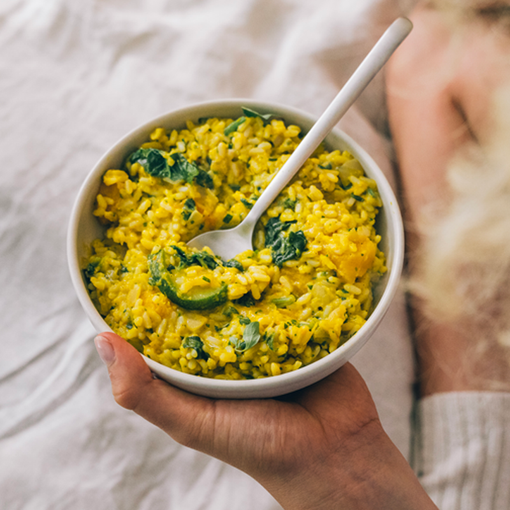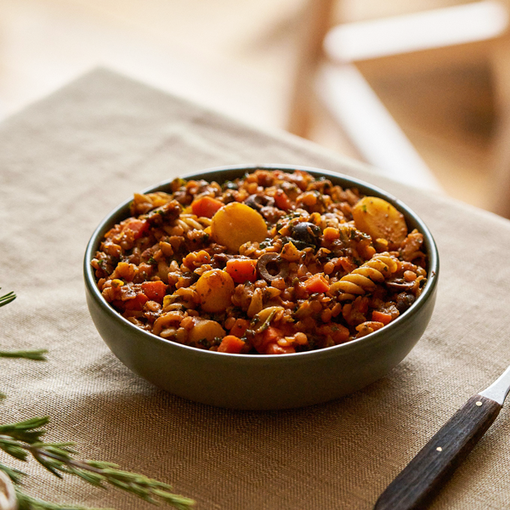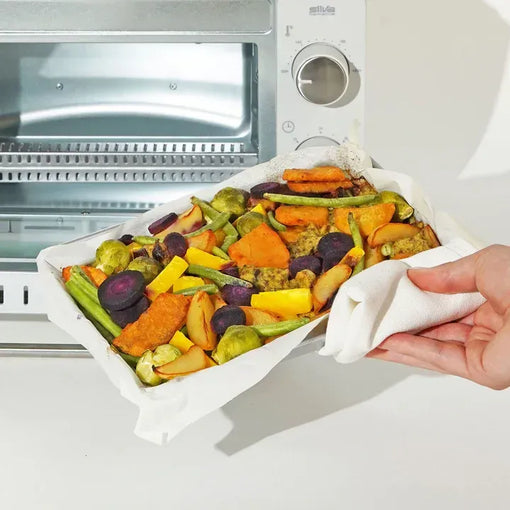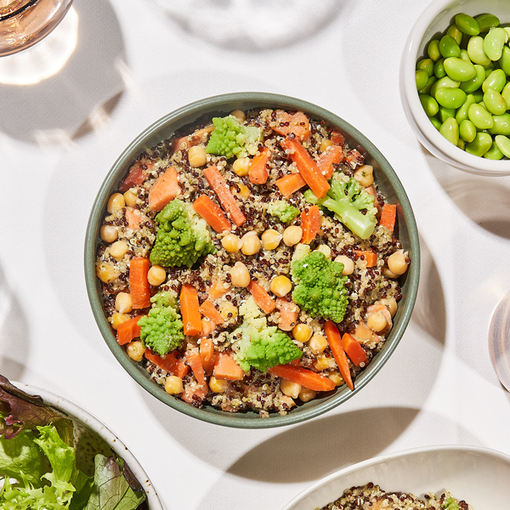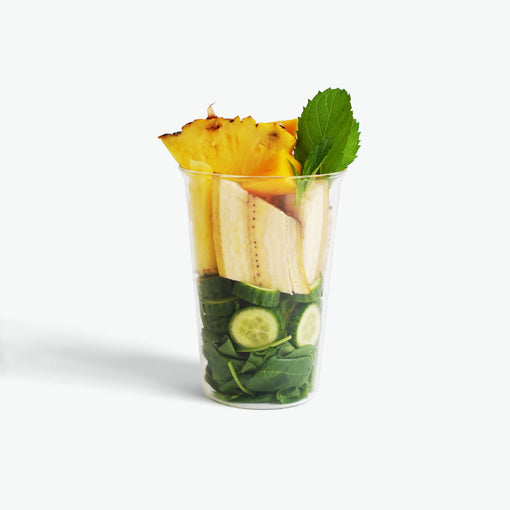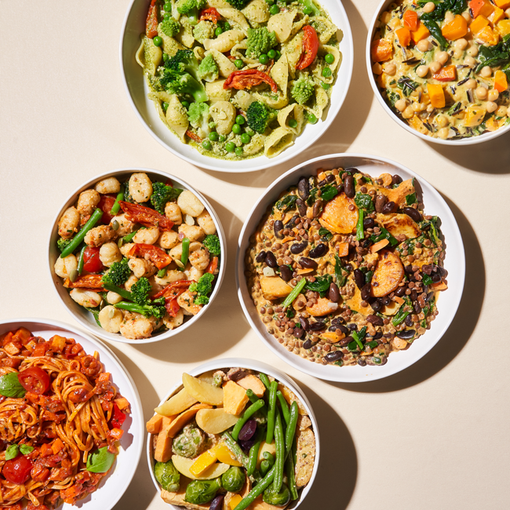Add {{ number }} more products to save {{ price }}
0
Add {{ number }} more products to save {{ price }}
noch 1 Produkt für gratis Versand (spare 5,99€)
Eat more plants: Every. x planted.
Together with Planted. we created new irresistible bowls with vegan chicken for you, made from pea protein! Another example to show that a purely plant based diet does not mean missing out on the foods you love, it just means replacing them!

Discover the true power of plants.
Plant based diets are a hot topic in the food scene. Not only for the numerous health benefits this diet promises, but increasingly for environmental reasons. Plant based eating has set itself apart from other diets by successfully bridging the gap between ‘food fad’ and lasting social change.
This social change is attributed to the fact that plant based eating encompasses far more than our diet. It touches on different areas of life that many of us hold near and dear. These include the climate crisis, animal rights, sustainable food production, and of course our health. This way of eating hits several birds with one stone. A plant-based diet reduces personal carbon emissions, protects animals, improves personal well being, and above all, helps protect the planet. Going plant based has evolved from a food trend into a sweeping social movement. This is made evident by the millions of people that have not only made the switch, they’ve never looked back. Furthermore, veganism is endorsed and widely promoted by the scientific community as an extremely effective way for individuals to contribute to climate change mitigation and a way to demonstrate sustainable consumerism.
As outlined above, the benefits of a plant based diet are numerous and go beyond health perks. Yet people are still skeptical of this lifestyle, and unfortunately also very set in their ways. We asked our community what their main concerns were regarding the switch to a plant based diet. The overwhelming responses stemmed from a belief that plant based diets were less satisfying, less nutritious and offered fewer options, compared to a diet with animal products. Upon closer inspection, specific issues ranged from: concerns about soy, insufficient protein amounts, artificial flavours, and that plant based versions of animal products must be heavily processed and filled with additives. In collaboration with planted we have created new bowls with plant-based meat substitutes, supplying you with all the nutrients and proteins you need.
Discover our Planted x Every. bowls:
Time to clear up some of these misconceptions and serve you with some facts! You’ll discover why plant based diets are not only healthy and ‘clean’, but delicious, nutritiously optimal and full of options. With the added bonus that being a plant-eater can make you into a planet-saviour.
Does a plant based diet mean limited options and cutting out foods I love to eat?
Why plant based is becoming mainstream
- There’s a widespread misconception that a plant based diet means you’re settling for less and have to trade in foods you love for bland, less satisfying versions. Not true!
Plant based options are not only full of exciting flavours, but they also offer diverse textures and outstanding health benefits.
A great rule of thumb for a plant based diet is to eat the rainbow. The more colourful your plate, the better. The benefits here are twofold. Experimenting with ingredient combinations not only ensures that you consume the necessary nutrients but simultaneously will automatically create a diversity in flavours and textures.
Plants contain valuable proteins, complex carbohydrates and important fats, all of which we need for comprehensive nourishment and to lead a healthy and active lifestyle.
This will also give you a dose of nature’s treasures: vitamins, antioxidants and minerals. The only thing not found in plants is Vitamin B12 which has to be supplemented. But don’t worry, that's easy to add.
The other valuable thing about plant-based diets, is that the nutrient amounts are better suited to what our body actually needs. The average vegetarian or vegan, consumes less cholesterol and saturated fats than a meat eater. This is essential for maintaining a healthy metabolism and to ward off cardiovascular disease. Furthermore, plant based eaters generally have better amounts of fibre, antioxidants, calcium, folic acid, magnesium and Vitamin C and E, thanks to their eclectic source of healthy foods.
Eclectic is an important word here and should accompany every plant-eaters' food choices. This is particularly relevant to guarantee adequate amounts of zinc, magnesium and calcium. This requires a little bit of thought and planning. Legumes, nuts and mineral water are all iron rich foods that possess the necessary properties to prevent any deficiencies. These are best combined with Vitamin C to ensure optimal absorption of these nutrients.
Do plant based diets offer a sufficient source of protein?
Plant vs. animal protein: a vegan diet supplies you with enough protein to cover your daily recommended intake.
Proteins are essential for growth and survival. Our body needs them for the production of DNA, enzymes and hormones. All proteins consist of amino acids, most of which our body produces itself. These are known as essential amino acids. The ones we can’t, we have to source externally through our diet. If there was any doubt that veganism was protein insufficient- rest assured: all essential amino acids are found in plants. Animal products aren’t special or ‘richer’ in this sense. Find out more about vegan protein sources in our article.
The recommended daily amount of protein is 0.8g per kg of body weight. So roughly 50-60g a day per person. This is far less than the average daily protein intake. There is a widespread distortion of how much protein we actually need and that this should come from foods like eggs, red meat, poultry and dairy products. As a result, not only do the majority of people in Germany over consume protein, but their food choices are resource-expensive and environmentally harmful.
As mentioned, one of the most frequent questions regarding a plant based diet, is whether the protein source is sufficient. This is an acute concern for individuals who require above average amounts of protein (pregnant women or athletes) and fear that plants can’t deliver the same properties the way meat and dairy do. Especially among athletes, for whom protein is necessary for muscle build and endurance, this fear is profound. However, closer examination of protein content in plants, concludes that this concern is misplaced and simply incorrect.
Plant based protein sources are found in legumes (soy, beans, peas, lentils), nuts, seeds, vegetables and grains. Here the same rule applies: the more diverse the assortment or the more colourful your plate, the better. So combinations like legumes with grains are ideal to facilitate optimal absorption of essential amino acids for your body.
Even for such protein-hungry individuals, plant protein is an excellent source of fuel. In fact, athletes that have switched to plant based, insist that eliminating animal products has boosted, not hindered, their performance. Watch Netflix’s ‘Gamechangers’. If we can’t convince you, maybe Arnold Schwarzenegger will.
So, not only is a plant based diet sufficient as a protein source, it's also more nutritious than animal products. Making you stronger, faster and healthier. The most natural and energising source of stamina.

Is a plant based diet better for the planet?
A ‘green’ plate = green footprint. A plant based diet isn’t just good for you, it's also immensely beneficial to the planet. For many, this isn’t an additional reason to go vegan, it's THE reason. And it's obvious why. Cutting out animal products dramatically minimises your carbon footprint. It is one of the most effective ways to personally contribute to mitigating the climate crisis.
Why?
Because raising livestock and the manufacturing of animal products is incredibly resource-expensive and harmful to the environment.
Meat and dairy production requires enormous areas of land and deplete water sources. Globally, around 50% of arable land (suitable for farming) is devoted to livestock and animal product production. This is a staggering number, and there’s more to it than meets the eye. Grazing and raising livestock makes up only a fraction of this area. The majority of this farmland is devoted to growing animal feed, which in turn becomes food for us. In Germany, 60% of all grain that is planted is devoted to animal feed.
These enormous areas of land necessary to grow feed, result in mass deforestation. Consequently, precious habitats, unique ecosystems and rare plant and animal species are lost. That steak is looking less appealing now, isn’t it? If all people lived on a plant based diet, 70% of the world's agricultural land could be repurposed, an area the size of the African continent. Let that sink in for a moment. The size of the African continent. It is hard to imagine what the world would look like, and how much healthier the planet would be if we repurposed land used for animal feed and gave it ‘back’ to the natural world.
Species, habitats and beautiful parts of the world could be restored, and we wouldn’t even have to eat less well!! The severity of the situation is exacerbated by the fact that animals are incredibly inefficient in processing and retaining the protein they receive in animal feed. Meaning, that we only receive a fraction of it when we ingest it. In cows, for example, only 4% of the protein is converted, which means that a staggering 96% are lost. This highlights a remarkable wastefulness of the resources that were invested. It would be far more efficient to consume plant protein directly and avoid the middle-animal. That way the protein and nutrients are absorbed directly, and the invested resources can be preserved.
Global agricultural production is also a powerful contributor to greenhouse gases levels in the atmosphere. About a quarter of global greenhouse gases are emitted from the food system. It starts with the use of land, the planting and processing of harvest, transport, consumption and disposal. Another reason why our planet would benefit immensely if we switched to plant based. Clearly, we make a choice with every meal we eat, either for or against the environment. In case these facts didn’t scare you enough, here are some numbers to underline how instrumental it is to reduce animal product consumption in order to preserve the environment.
Producing 100 grams of protein from peas emits just 0.4kg of CO2. To get the same amount of protein from beef, emissions would be 90x higher, at 35 kgCO2.
The signs are pretty clear.

Reducing your consumption of meat and dairy products has a massive impact on the environment. Every food choice we make has consequences, and its up to us to decide what matters more. As we have outlined here, there are virtually zero reasons why we shouldn’t all make the switch and help mitigate the escalating climate crisis. If you think about it, it's really not a big ask. We’ve explained the benefits of a plant based to you, from both a health and environmental perspective, and let's face it they’re pretty convincing individually, and irrefutable combined. If plant based options give you better nutrition, better protection against illness and often taste better than meat options--you really don’t have an excuse. Even you, athletes, the science is in, you know you can give up that steak and still make a PB. Individual change is already a great contribution. But if we can convince our friends and family and make sure this change is lasting, then maybe we can sleep easier at night knowing we’re really trying to make the world a better, greener place.

What does the future hold
Food innovation is looking easy peasy! Read to find out why peas are the meat of the future
The reasons why we should all opt for meat alternatives are wide ranging. Do you want to reduce your meat consumption? Are you plant based, but miss the taste of meat? Do you love eating meat, but are still curious to try something new? The market for meat substitutes is h-o-t.
New options are constantly popping up, boasting imperceptible differences between the real thing and the plant based option.
Products containing soy hold first place as the most established and popular meat alternative. Meat consumption in Germany is gradually sinking and other meat alternative protein sources such as oats are receiving more attention. Discover more about vegan meat alternatives here.
The Problem: most meat alternatives are heavily processed and contain a lot of additives and flavour enhancers to perfectly mimic the original product. We’ve found a way in which these can be avoided.
The Solution: peas! This tiny green power bean has remarkable abilities to recreate the taste, colour, and texture of meat, its really uncanny. In addition, peas are more sustainable than most plant based protein sources. This is because they can be grown locally and don’t require long transport routes.
Already during its growth phase, peas have climate-protective properties due to the fact that they require less fertilizer and bind nitrogen from the soil.
Pea flour combined with rape seed oil, water, heat and pressure, can create a meat alternative entirely free of additives.
Additional bonus point: vitamin B12 is often added to pea ‘meat’ to ensure supply of this critical nutrient.

Plant based living means natural and flavorful well being!
Why are we telling you this? We have very exciting (and delicious) news. Together with the Swiss manufacturer Planted, we have created three new products for you. Planted produces 100% natural animal protein alternatives. These are nutritious, free of additives and entirely plant powered. We want to prove to you how easy (and delicious) it is to follow a plant based diet.
We have taken three classic meals and reinterpreted them with an Every twist. A delightful blend of fresh vegetables, Planted chicken and complementary spices: Bami Goreng, Tikka Masala, and Umami Rice.
Our bowls are just as delicious as they are natural and nutritional. We wanted to guarantee that everyone--no matter what their choice of diet--had an Every option that satisfied their cravings!
Treat yourself to one of our new bowls and convince yourself. Discover our entire collection here!
__________________
Sources:
Environmental impacts of food production - Our World in Data
Beyond und Oatly: Marktanteil alternativer Proteine wächst rasant (handelsblatt.com)
BMEL-Statistik: Futtermittel (bmel-statistik.de)
Chicken, wie es sein sollte | CHICKEN (eatplanted.com)
Vegetarier erleiden seltener einen Schlaganfall (aerztezeitung.de)
Landwirtschaft: Was wäre, wenn alle Menschen vegan wären? | agrarheute.com
Summary for Policymakers — Special Report on Climate Change and Land (ipcc.ch)
Erbsen - tiefgekühlt oder aus der Dose? | NDR.de - Ratgeber - Verbraucher
Vegan Diet Health Benefits in Metabolic Syndrome (nih.gov)
https://www.dge.de/wissenschaft/weitere-publikationen/faqs/protein/?L=0
Carbon Footprint Factsheet | Center for Sustainable Systems (umich.edu)







